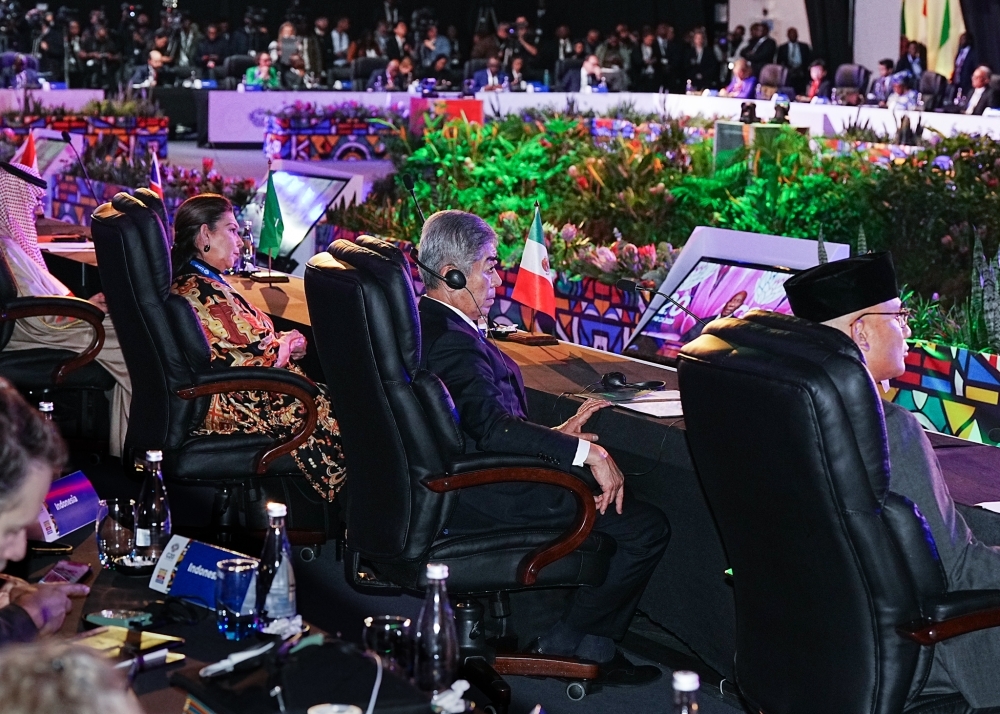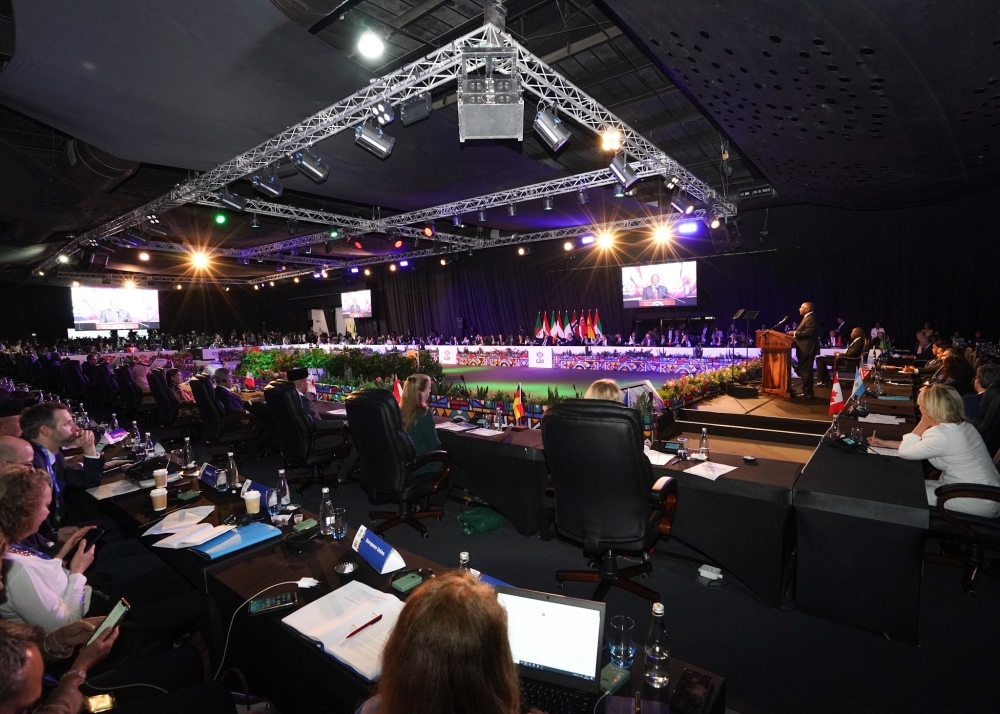G20 (Summit on Financial Markets and the World Economy)
G20 Foreign Ministers’ Meeting (Summary of Day 1)


On February 20 local time (February 20 to 21, JST), the G20 Foreign Ministers’ Meeting was held in Johannesburg, South Africa. Mr. IWAYA Takeshi, Minister for Foreign Affairs of Japan, attended the meeting. The overview of day 1 is as follows.
1. Session 1 “Opening”
In this session, which started at 2:30 p.m., local time (9:30 p.m., JST) and lasted for approximately 30 minutes, H.E. Mr. Matamela Cyril Ramaphosa, President of the Republic of South Africa and Hon. Mr. Ronald Lamola, Minister of International Relations and Cooperation of the Republic of South Africa gave opening speeches.
2. Session 2 “Global Geopolitical Situation”
In this session, which was held from 3:40 p.m., local time (10:40 p.m., JST), for approximately 4 hours and 20 minutes, participants discussed regional affairs, including the situations in Ukraine and the Middle East.
- At the outset, Foreign Minister Iwaya made the following remarks. (i) Beginning with Russia's aggression against Ukraine, the international community faces major challenges to the rule of law, and it is necessary to firmly restore an international order based on the rule of law and to ensure peace and stability in the international community. (ii) Unilateral attempts to change the status quo by force should never be tolerated anywhere in the world, including in the East China Sea and the South China Sea. (iii) Based on these perspectives, Japan will continue to promote concrete coordination and cooperation with its partners towards realizing a “Free and Open Indo-Pacific.”
- Foreign Minister Iwaya made the following remarks on the situation in Ukraine, and other issues. (i) Regarding Russia’s aggression against Ukraine, various diplomatic efforts are currently ongoing to achieve peace, and we hope that these efforts will lead to an end to the prolonged combat and help achieve a breakthrough in this difficult situation. (ii) To achieve peace, Japan will continue to support Ukraine, while cooperating with like-minded countries, and contribute to Ukraine’s mid- to long-term recovery and reconstruction support. (iii) The security of Europe and Asia is inseparable. Japan expresses serious concern over the Russia-North Korea cooperation, and strongly condemns the engagement of North Korean troops in combat. A robust response by the international community, including the full implementation of UN Security Council resolutions, is essential. (iv) Japan asks for understanding and cooperation from the G20 and other countries for the immediate resolution of the abductions issue.
- Foreign Minister Iwaya made the following remarks on the situation in the Middle East. (i) Implementing the ceasefire agreement steadily and in good faith in Gaza is important. The “day after” in Gaza is directly linked to mid- to long-term peace and stability in the Middle East. The International community has to back and stand behind it. Japan will continue to support a two-state solution. Japan will provide urgent humanitarian assistance, and play an active role in mid- to long-term recovery and reconstruction support. (ii) Regarding Syria, it is imperative to improve the humanitarian situation that has deteriorated over many years, to prevent further refugees and displaced persons. In addition, the future of Syria should be determined by the Syrian people, and it is important to ensure a peaceful, stable, and inclusive transition to prevent ISIL from expanding its influence again.
- Foreign Minister Iwaya made the following remarks on the situation in Africa. Peace and stability in Africa are also extremely important. Regarding the situations in Sudan and the eastern Democratic Republic of the Congo, Japan is deeply concerned about the deteriorating humanitarian conditions in both countries and neighboring countries, particularly on the ground. The international community needs to act in unity to urge the parties involved to negotiate for a ceasefire and sustainable peace.
- Lastly, Foreign Minister Iwaya pointed out that the G20 needs to take the lead in international cooperation, so as to lead the world to cooperation rather than division. Foreign Minister Iwaya also expressed Japan’s intention to seek common ground through dialogue, and advance concrete coordination and cooperation that transcends different positions and confrontation and in which all countries share responsibility.
(Reference)G20 Foreign Ministers’ Meeting
- Schedule Thursday, February 20 Session 1 “Opening Session” Session 2 “Discussion on the Global Geopolitical Situation” Friday, February 21 Session 3 “G20 objectives in 2025: Reflection on South Africa’s G20 Presidency High-Level Deliverables and the Review of the G20@20”
- Participating countries and international organizations for G20 Foreign Ministers’ Meeting i: G20 members Japan, South Africa (Presidency), Argentina, Australia, Brazil, Canada, China, France, Germany, India, Indonesia, Italy, Mexico, Republic of Korea, Russia, Saudi Arabia, Türkiye, United Kingdom, United States, African Union (AU), European Union (EU) ii: Invited countries Algeria, Egypt, Ireland, Netherlands, Nigeria, Norway, Singapore, Spain, United Arab Emirates iii: International organizations African Continental Free Trade Area (AfCFTA), African Development Bank (AfDB), Council of Europe Development Bank (CEB), Common Market for Eastern and Southern Africa (COMESA), East African Community (EAC), Economic Community of Central African States (ECCAS), Economic Community of West African States (ECOWAS), Food and Agriculture Organization (FAO), Institute for Economic Justice (IEJ), International Monetary Fund (IMF), International Telecommunication Union (ITU), New Development Bank (NDB), Organisation for Economic Co-operation and Development (OECD), Southern African Development Community (SADC), The South Centre (TSC), United Nations (UN), United Nations Conference on Trade and Development (UNCTAD), United Nations Economic Commission for Africa (UNECA), World Bank (WB), World Health Organization (WHO), World Trade Organization (WTO)

